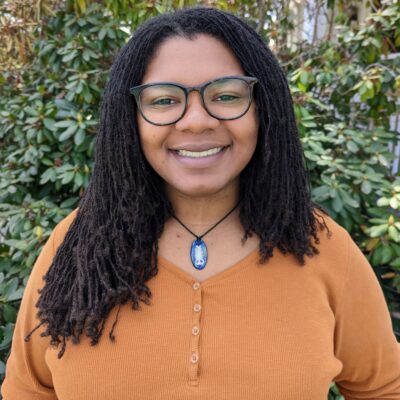Student Spotlight: Aleah Butler-Jones

February 19, 2024
Aleah Butler-Jones is a M.S./Ph.D. student in horticulture from South Orange and Orange, New Jersey. She earned her B.S. in agricultural sciences from Cornell University, and now studies Palmer amaranth as well as electrical weeding’s impact on agroecosystems under the guidance of Lynn Sosnoskie at Cornell.
What is your area of research and why is it important?
My master’s research focuses on Palmer amaranth, an extremely troublesome weed commonly found across the U.S. Midwest, South, and Mid-Atlantic. My work confirms the presence of glyphosate-resistant Palmer amaranth in New York and evaluates its sensitivity to other active ingredients used in New York agricultural production. My Ph.D. research examines electrical weeding, a novel weed management technology, and its impact on weed and soil biological communities. In addition, I plan to evaluate the mechanism behind electrical weeding. Understanding this novel technology and its impact on surrounding agroecosystems is crucial to its successful integration into agricultural production systems.
What are the larger implications of this research?
New York state is in the early stages of glyphosate-resistant Palmer amaranth’s spread. While eradication may still be possible, it will require rapid institution of a regulatory framework, access to funds, and collaboration between various partners. Herbicide resistant weeds pose many challenges to growers, and therefore require alternative and integrated approaches to address the threat they pose. Electrical weeding is in its nascent stage. This presents a unique opportunity to proactively evaluate the forces that this novel technology may exert on weed and soil biological communities prior to its wider adoption.
How did you become interested in your field of study?
I grew up loving the outdoors and tending to my mother’s extensive garden. This, along with on-farm experiences, inspired me to study agriculture in undergrad. Fortunately, I loved this field of study from the beginning. While I knew early on that I wanted to work with crop production, I was not sure in what capacity. In summer 2017, I was introduced to weed science through participating in the Cornell Weed Science Team. It was a great experience and further coursework in the subject cemented my interest in weeds. I’m still fascinated by these resilient organisms.
You won the 2024 Northeastern Weed Science Society’s graduate student paper contest. What does this mean to you?
It was a great honor! While it was only my second time attending the Northeastern Weed Science Society’s (NEWSS) annual conference, I’ve engaged with the society since undergrad primarily through Collegiate Weed Science Contests. NEWSS and the Weed Science Society of America (WSSA) are great societies that offer many opportunities for early-career weed scientists to connect, share our work, and improve upon our ability to effectively communicate. My win only motivates me to be more involved in these scientific societies.
You recently participated in a roundtable with the USDA deputy secretary. Can you talk about this experience?
While representatives from several groups ranging from scientists to growers to public servants were present, I was one of two graduate students invited to a roundtable discussion with Deputy Secretary Xochitl Torres Small at Cornell AgriTech in December 2023. It was great to hear a range of perspectives from different players within New York agriculture and how it relates to wider U.S. agricultural policy and federal initiatives. The experience reinforced the idea that agriculture is still one of the bedrocks of our society and directly impacts many of society’s facets.
President Pollack has designated this academic year’s theme as freedom of expression. What does freedom of expression mean to you?
We grow best when exposed to new ideas, perspectives, and approaches. As scientists, we must identify and address the challenges facing our world. This cannot adequately or effectively be achieved without identifying or understanding the problem. Our stakeholders need to feel that they can be truly honest and open about their circumstances even if it is uncomfortable to hear. Freedom of expression is central to building that trust.
What are your hobbies or interests outside of your research or scholarship?
Outside of my research, I’m involved in a few endeavors. I volunteer at Elmira Community Cycle, a volunteer-run, educational bike workspace. I love being on the water and am focused on sailing as of late. In addition, I enjoy seeing live music, flying kites, finding good deals at estate sales, and sending cards and letters to friends and other loved ones.
Why did you choose Cornell to pursue your degree?
Cornell has a long history as a leader in plant science research. In addition to this, the facilities and resources available on the Ithaca campus and at Cornell AgriTech provide many opportunities to conduct novel and impactful research across the basic-applied spectrum. Finally, I stayed at Cornell for the opportunity to work with and be mentored by my PI, Lynn Sosnoskie. She brings a wealth of experience from a range of cropping systems across the United States. I have truly grown as a scientist through my education at Cornell and under her tutelage.
